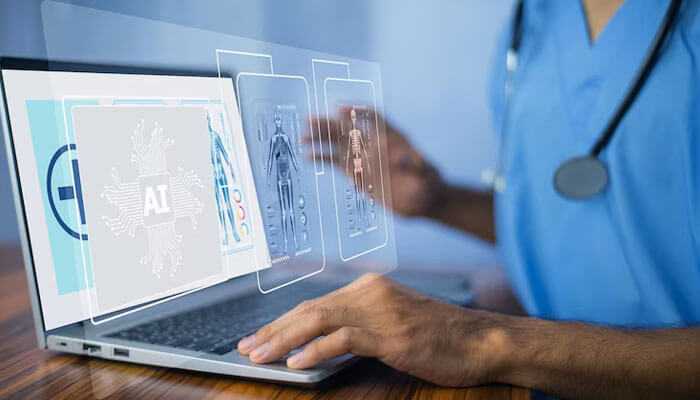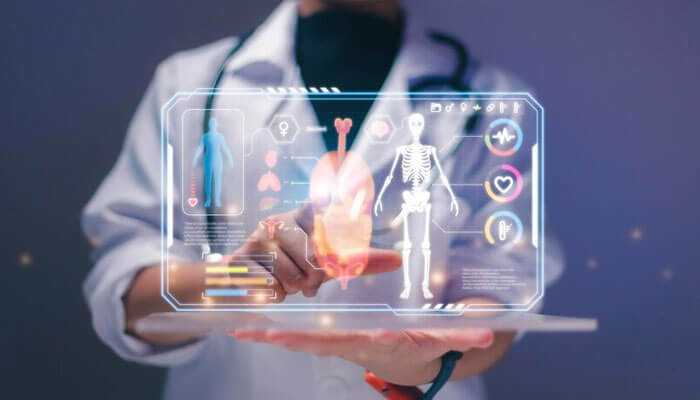The success of healthcare depends on accurate diagnosis, as misdiagnosis can lead to severe consequences like incorrect treatment, unnecessary procedures, or death. Technological advancements like AI are reshaping diagnostic processes by improving accuracy and enabling faster, more reliable results. Healthcare professionals are now using AI-driven healthcare solutions to assist in identifying diseases and conditions. This change not only reduces human error but significantly improves the speed and accuracy of diagnostic processes.
Evolution of AI in Healthcare Diagnostics
AI plays a pivotal role in improving outcomes as the medical field advances. New AI systems have helped achieve goals such as faster data collection and processing. AI’s journey in healthcare has been gradual but revolutionary, and understanding how it has evolved gives us insight into its current capabilities in improving diagnostic accuracy.
The Early Days of AI-Driven Healthcare
In the early days, AI-driven healthcare faced skepticism. AI applications, in the beginning, focused mainly on basic tasks; however, their potential became evident over time.
Milestones in AI Adoption
AI has made significant progress by developing machine learning and neural networks. These technologies allowed management systems to analyze large amounts of medical data.
Here are some milestones in AI adoption:
Early Developments
• 1956: The term “Artificial Intelligence” was introduced at the Dartmouth Conference.
• 1957: Frank Rosenblatt developed the first neural network, “The Perceptron.”
• 1965: Joseph Weizenbaum created ELIZA, an early natural language processing chatbot.
Machine Learning Revolution
• The 1980s: This era saw the rise of expert systems that used rules and knowledge bases to solve problems.
• 1990s: The development of support vector machines (SVMs) and decision trees.
• 2000s: Deep learning emerged as a technique that used artificial neural networks with multiple layers to process complex data.
AI in Healthcare
• 2010s: AI-powered medical imaging systems started outperforming human radiologists in detecting certain types of cancer.
• 2016: Google’s AlphaGo defeated world champion Go player Lee Sedol, demonstrating the power of deep learning.
• 2018: AI-powered drug discovery tools began accelerating the development of new medications.
AI’s Impact on Diagnostics
Today, AI is used across multiple diagnostic fields. From radiology to pathology, AI assists in recognizing patterns that are otherwise challenging for humans to detect. AI’s ability to quickly process complex data is a significant advantage in modern healthcare diagnostics. For example, AI-driven analysis can more easily identify tumors, leading to early intervention and personalized disease management and treatment.
Applications of AI in Diagnosing Diseases
AI is being used in various healthcare fields to improve diagnostic precision. Let’s look at some specific areas where AI is making a buzz.
Medical Imaging
AI-driven healthcare has improved the accuracy of interpreting MRI, CT scans, and X-rays. AI algorithms analyze images faster and more accurately, aiding radiologists in early diagnosis and personalized treatment plans.
Pathology
AI detects abnormalities in tissue samples by analyzing cellular structures often difficult to see with the naked eye, improving accuracy in diagnosing cancers and other conditions.
Genomics
Artificial intelligence helps identify genetic mutations and predispositions to diseases through AI-driven tools. They analyze genetic data quickly, assisting in diagnosing conditions such as hereditary diseases.
Cardiology
AI-driven healthcare helps detect heart conditions by analyzing cardiology tests like echocardiograms. They identify early signs of heart disease, improving the chances of successful treatment.
Dermatology
Along with medical imaging and cardiology, AI also significantly impacts dermatology. AI-based skin cancer detection systems assist in analyzing images to provide accurate diagnoses faster than human specialists.
Benefits of AI in Diagnostics

AI is revamping the healthcare industry by providing benefits like automating daily tasks, reducing human errors, and improving patients’ experiences. These advantages are improving diagnostic processes.
Automating Routine Tasks
By automating administrative tasks like data entry and report generation, AI frees the time of healthcare professionals so that they can focus on patient care.
Diagnostic Accuracy
AI has the power to analyze high volumes of data with accuracy and precision, reducing the likelihood of human error. This improvement leads to better diagnostic outcomes and fewer misdiagnoses.
Better Patient Experience
AI-powered tools personalize patient care, provide timely information, and improve communication between patients and healthcare providers for a satisfying experience.
Faster Results
AI-driven tools provide results quickly, helping clinicians make the right decisions faster, which is critical in emergencies.
Scalability
AI systems are versatile and can handle a high volume of data across various medical fields. This adaptability allows AI tools to be used in a wide range of diagnostic applications without sacrificing performance.
Data-Driven Insights
Artificial intelligence can easily decode complex data patterns at a scale that is difficult for humans. This capacity gives physicians insights that can lead to better decision-making and more personalized treatment plans.
Challenges and Limitations
Healthcare app development services face certain challenges while integrating AI into their applications. Some limitations include:
Ethical Concerns
Whenever AI is discussed, ethical considerations follow. Should AI be trusted with decision-making and medical diagnoses? The healthcare sector still needs clear guidelines to address this. Although AI improves diagnostic accuracy, ensuring trust and fairness in decision-making is crucial. Addressing AI ethical concerns requires balancing technical, legal, and societal factors. We must work for fairness, transparency, and accountability in AI development to ensure these powerful tools are used responsibly.
Data Privacy
AI systems rely on access to vast amounts of medical data, making the security and privacy of patient data a significant concern. To combat this, strict measures must be implemented to protect patient data from unauthorized access, breaches, and misuse. Encryption techniques, secure data storage practices, and strict access controls are some ways to safeguard PHI.
Human Supervision
Despite its exemplary capabilities, AI can never fully replace human beings. Human oversight is necessary when using AI tools to make the diagnostic process fast and accurate. Clinicians must review AI-driven diagnostics to ensure accuracy and avoid overreliance on algorithms.
AI Integration into Healthcare
HL7 interface engine helps in the proper integration of AI into existing healthcare systems by offering smooth data exchange and interoperability among different applications. It provides healthcare interoperability solutions and a standardized communication structure between different systems, such as EHRs, lab information systems, and telehealth platforms, for consistent patient data transfer.
Real-Life Examples of AI-Powered Tools
Some AI tools are already proving their value in improving diagnostic accuracy. Here are a few examples of their impact on healthcare.
IBM Watson for Health
IBM Watson is one of the leading AI tools in healthcare. It helps oncologists diagnose cancer by analyzing medical data and suggesting treatment options.
Zebra Medical Vision
Zebra Medical Vision uses AI algorithms to analyze medical images. It assists radiologists in detecting conditions such as pneumonia, breast cancer, and liver diseases, significantly improving detection accuracy in these areas.
Google Health AI
Google Health AI focuses primarily on disease detection. Its algorithms analyze medical data to identify early signs of disease for timely medical intervention. Google’s AI tools have successfully improved diagnostic accuracy, especially in retinal imaging and cancer detection.
The Future of AI in Healthcare Diagnostics
AI in healthcare diagnostics is still on its way to gaining its full potential. In the future, expect AI to take up more significant roles in improving health outcomes.
AI and Precision Medicine
AI has shown a promising future for precision medicine. AI-driven diagnostics could personalize treatment based on individual patient data, leading to better outcomes.
Predictive Diagnostics
AI may soon be able to predict the likelihood of diseases before they even occur. This potential means doctors could take measures earlier to prevent disease progression and improve patient care.
Collaboration Between AI and Clinicians
It’s a given that AI is not here to replace doctors. Instead, its goal is to work alongside healthcare professionals, providing data and insights to improve diagnostic accuracy. This collaboration will ensure better healthcare outcomes for patients.
Conclusion
AI is transforming healthcare for the better with faster, more accurate diagnoses and personalized treatments. From medical image analysis to decoding complex genetic data in seconds, AI-driven healthcare is aiding healthcare professionals in improving decision-making processes and overall patient outcomes.
As AI-driven healthcare advances, collaboration between AI and healthcare professionals will become crucial to maintaining ethical balance. AI in healthcare will lead to better care quality and patient satisfaction rates. Custom healthcare software development will contribute to this future by seamlessly integrating AI into healthcare systems.



